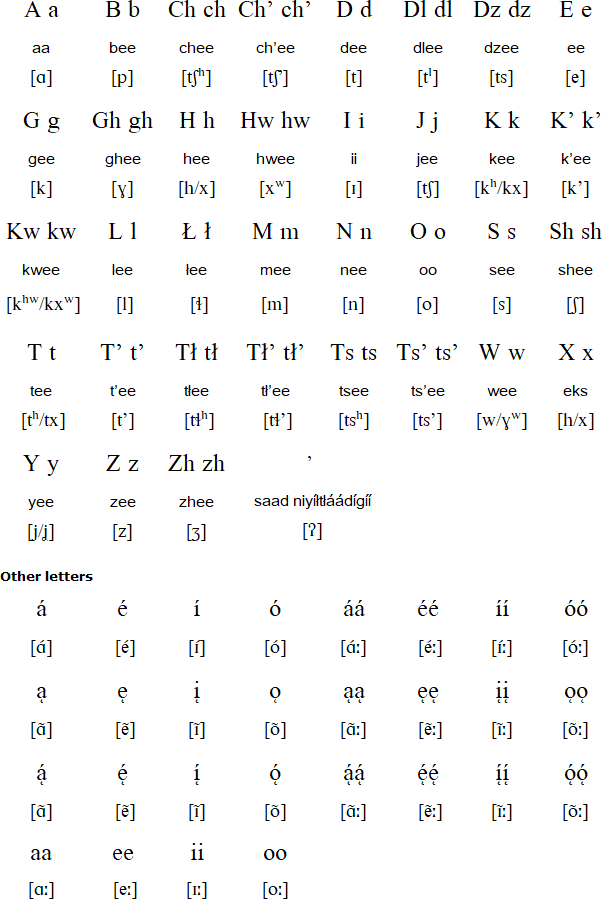Navajo is a member of the South Athabaskan branch of the Na-Dené language family. It is spoken mainly in the Navajo Nation (Naabeehó Bináhásdzo), a Native American territory in northeastern Arizona, southeastern Utah, and northwestern New Mexico in the USA. In 2011 an American Community Survey found that 169,359 people spoke Navajo at home. Navajo is related to the Apache languages, although not mutually intelligible with them.
[top]
Navajo first appeared in writing in 1849 in the form of a Navajo word list published in the Journal of a Military Reconnaissance by Lt. James H. Simpson. At the beginning of the 20th century missionaries began producing religious texts, dictionaries and grammars in Navajo. Each missionary invented his own spelling system so many different ways to write Navajo emerged. In the 1930s however, John Collier, the head of Indian Affairs and Willard Beatty, the head of Indian Education, decided that a standard Navajo alphabet was needed and they commissioned John Harrington, Robert Young, William Morgan and Oliver LaFarge to create such an alphabet, and to publish Navajo language materials.
By 1939 the new alphabet was finished and during the 1940s the first bilingual primers, Navajo language children's books, a modern dictionary, and a monthly newsletter were published. Unfortunately this alphabet was not popular among the Navajo, partly as a result of their anger at Collier's policies on livestock reduction, which led them to distrust his literacy drive.
Recently there has been a revival of interest in the Navajo language and the development of Navajo computer fonts has made it much easier to write, edit and publish written material in Navajo.
[top]
Navajo has been taught in schools in the Navajo Nation since 1984, and a number of immersion programs have been set up. Since 1989 the Diné College in Tsaile in Arizona has offered an associate degree in Navajo. Classes in Navajo are also available at Arizona State University.
The first Navajo newspaper was published between 1943 and 1957. Today there are Navajo radio stations, Navajo broadcasts on TV, and the 1977 film Star Wars has been translated into Navajo.
[top]

Hear Navajo pronunciation
Download an alphabet chart for Navajo - also includes phrases and numbers (Excel)
[top]
Bílaʼashdlaʼii tʼáá ałtsoh yiníkʼehgo bidizhchįh dóó aheełtʼeego ílį́į́go bee baahóchįʼ. Eíí háníʼ dóó hánítshakees hwiihdaasyaʼ eíí binahjį́ʼ ahidiníłnáhgo álíleekʼehgo kʼé bee ahił niidlį́.
Hear a recording of this text by Onri Jay Benally
All human beings are born free and equal in dignity and rights. They are endowed with reason and conscience and should act towards one another in a spirit of brotherhood.
(Article 1 of the Universal Declaration of Human Rights)
Information about Navajo | Phrases | Numbers | Family words | Tower of Babel
[top]
Information about the Navajo language
http://en.wikipedia.org/wiki/Navajo_language
http://www.native-languages.org/navajo.htm
http://www.gomyson.com
Online Navajo lessons
http://cali.arizona.edu/maxnet/nav/
Navajo slang
http://www.angelfire.com/rock3/countryboy79/navajo_slang.html
Official website of the Navajo Nation
http://www.navajo.org/
Navajo Language Academy
http://navajolanguageacademy.org/nla.htm
Navajo Times - The Newpaper of the Navajo People (in English)
http://www.navajotimes.com
Navajo Code Talkers' Dictionary
http://www.history.navy.mil/faqs/faq61-4.htm
Ahtna, Apache (Western), Babine-Witsuwit'en, Chilcotin, Chipewyan, Deg Xinag, Dena’ina, Dane-zaa (Beaver), Eyak, Gwich'in, Hän, Hupa, Jicarilla, Kaska, Koyukon, Lipan Apache, Lower Tanana, Mescalero-Chiricahua, Navajo, North Slavey, Sekani, South Slavey, Tahltan, Tanacross, Tłı̨chǫ (Dogrib), Tolowa, Tsuut'ina (Sarcee), Tutchone, Upper Kuskokwim, Upper Tanana
Languages written with the Latin alphabet
Page last modified: 11.01.24
[top]
You can support this site by Buying Me A Coffee, and if you like what you see on this page, you can use the buttons below to share it with people you know.

If you like this site and find it useful, you can support it by making a donation via PayPal or Patreon, or by contributing in other ways. Omniglot is how I make my living.
Note: all links on this site to Amazon.com, Amazon.co.uk
and Amazon.fr
are affiliate links. This means I earn a commission if you click on any of them and buy something. So by clicking on these links you can help to support this site.
[top]